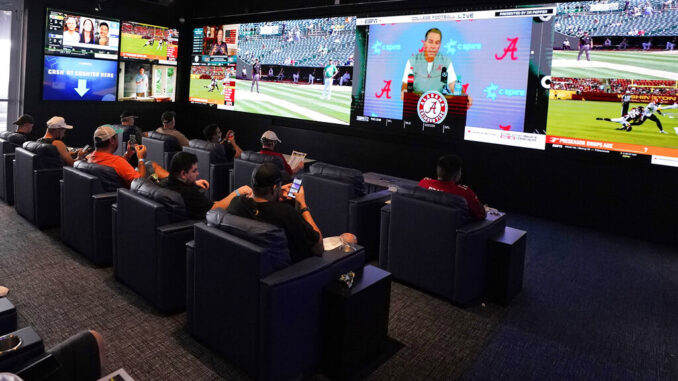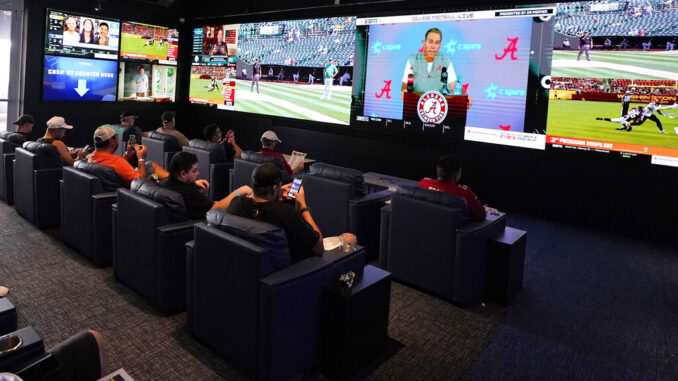

RALEIGH – A bill currently in the General Assembly would add North Carolina to a growing list of states offering sports betting following a 2018 U.S. Supreme Court decision that permits states to do so.
The decision in the case, Murphy v. National Collegiate Athletic Association, opened sports betting to each individual state. In a 6-3 decision, Justice Samuel Alito said that, “Congress may not simply ‘commandeer the legislative process of the States by directly compelling them to enact and enforce a federal regulatory program.’” The result permitted each state to consider their own plans for sports betting.
Since that decision, 26 states and the District of Columbia have enacted some form of sports betting, according to the American Gaming Association in a Sept. 8 Associated Press report.
North Carolina has not enacted a state-supported plan, but it could happen as this year’s legislative session winds down.
The N.C. Senate approved Senate Bill 688 in August by a 26-19 vote that split both Republicans and Democrats. Senate Leader Phil Berger (R-Eden) notably voted for the bill along with eight other Republicans and a plurality of the chamber’s Democrats.
The bill, which is co-sponsored by state Sens. Jim Perry (R-Lenoir) and Paul Lowe (D-Forsyth) is awaiting committee hearings in the N.C. House of Representatives. Sources tell North State Journal that senior House leadership has committed to seeing the bill through, although time is running out as the state budget and redistricting will consume legislators’ time in the coming weeks.
Among the provisions of the bill are restricting its use to those 21 and older, housing regulation under the North Carolina Lottery Commission, awarding licenses to between 10 and 12 companies, a $500,000 application fee for companies, and an 8% state tax. Additionally, the bill creates a fund that uses half of the tax collecting from sports betting to promote major sports, music, entertainment, and political events in the state.
Enthusiasm from sports fans isn’t enough to make betting legal, however. Also contained in the bill are proposed new offenses and enforcement for illegal sports betting. In a fiscal summary from the legislature’s nonpartisan research division, “criminal offense modifications in the proposed
bill may have a fiscal impact on the judicial and correction systems.”
The fiscal summary continues, saying, “due to a lack of sufficient historical data on this offense or similar offenses, the Fiscal Research Division (FRD) is unable to provide a reasonable estimate of the total fiscal impact. Each additional person charged will have a cost to the judicial system and each additional person convicted will have a cost to the correction system.”
Also, some opposed to expanding sports betting are concerned about longstanding illegal sports gambling ties to criminal activities.
The FBI’s organized crime division says organized crime groups often use the money made from illegal gambling to fund other criminal activities like the trafficking of humans, drugs, and weapons. “These operations may also be involved in tax evasion and money laundering,” according to the bureau’s Integrity and Sports Gaming Initiative.
To address those concerns, SB 688 says each licensee must report, as soon as practicable, any information relating to abnormal betting activity or patterns that may indicate a concern with the integrity of a sporting event or events, or any other conduct that corrupts a sports wagering outcome of a sporting event or events for purposes of financial gain, including match fixing.
Ches McDowell, a Raleigh-based lobbyist, says, “The evidence clearly shows that the people who bet on sports are not the people down to their last $10 to be on the Cowboys to win $4. People who bet on sports are generally male, ages 30-50, with disposable income, and higher levels of education that the general public. Sports betting is very different than spinning a roulette wheel or buying a lottery ticket – knowledge is required.”
McDowell has been involved in some of the discussions around the bill.
While the state continues to examine whether it will permits sports betting, those wishing to bet on their favorite teams can head to the NC mountains to place a wager.
In March, Harrah’s Cherokee casinos opened tribal sports betting venues at its Cherokee and Murphy locations.
“As the first sports betting venue in North Carolina, The Book (the venue name) provides an innovative, Las Vegas- style gaming experience to our guests,” said Brooks Robinson, regional senior vice president & general manager of Harrah’s Cherokee Casinos.



